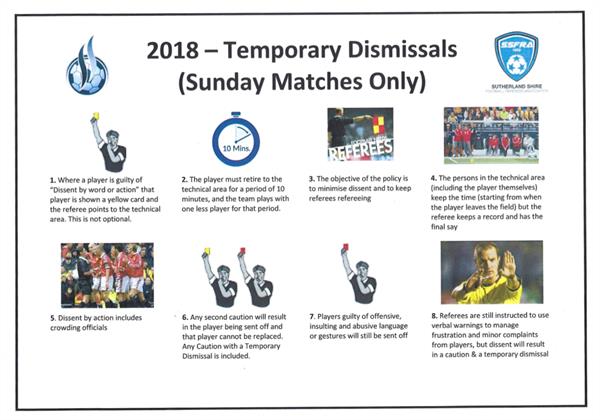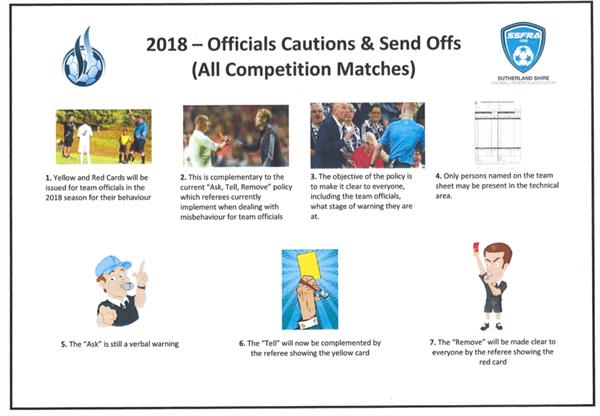A general revision of the Sutherland Shire Association Rules takes place every two (2) years – such revisions shall be held during October in the years
ending in an uneven number. Here are some of the changes which will apply to SSFA games from Round 1 (all changes will be updated in the SSFA Rule Book and By Laws 2018) …
MiniRoos Rule Changes – please see Rule Book for all changes:
MiniRoo Rule 2 – Field of Play
E. Penalty Area
Delete current rule and replace as follows:
U6 & U7 – No penalty area
U8 & U9 – Rectangular – 5 metre deep x 12 metre wide
U10 & U11 – Rectangular – 10 metre deep x 20 metre wide
The penalty area can be marked by the use of marked lines, flat or soft markers or cones.
MiniRoos Rule 6 – Duration of Games – Under 6 and Under 7
Delete “15 minutes” after “2 x” and replace with “20 minutes”
ie u6 and u7 games will now be 20 minutes per half with 5 minutes half time.
RULE 6 – add “All regrading decisions will be final and not subject to any appeal.”
Temporary Dismissals – the SSFRA are trialling a new system, similar to a “Sin Bin”, on Sunday’s in 2018: Some points to note:
- Sin bin concept for dissent to refs
- players are sent off for 10 minutes – yellow card shown
- Sunday teams only (incl W18, etc)
- If you are in Sunday competition and playing Friday night – concept applies
- If sent off for 10 minutes, player must sit in Technical area
- Can receive a 2nd yellow = red if hurling dissent while sitting in technical area
- Dissent can still be punished with a straight red
- Other bookable offences (e.g. rough play) = normal yellow, no sin bin
- Player must request to come back on
- Referee has final say for player to come back on
- Ball must be out – so if stays in play for a time period after the 10 mins is up, player cant come back on
- Offences include crowding a referee – when more than 2 players gather around a ref, 3rd player and each after will get sin binned
- If 5 players sin binned, leaving only 6 on field – the game will terminated


- Yellow and red cards can be handed out to coaches and managers
- Applies to all competition matches (12’s and up – regardless of day)
- Ask, tell, remove still applies
- If red card shown – they must leave the “technical area” and referee must submit a report naming the coach / manager on the match sheet
- Fines (TBC) apply if no names listed on match sheet and a send off occurs


——————————————————-
2017 Rule Changes
If you have watched any football competition that kicked off after 1 July 2016, you would have noticed that a number of the laws have changed. Some
are very obvious (like the new kick-off rule) but most only occur occasionally. With over 70 law changes, there is too much detail to go into in a
one-page summary. However, that is why the referees have been undergoing online and in-person training since September to make sure they are as across
the changes as they can be.
These changes will apply to SSFA and FNSW competitions from 2017 onwards.
The law changes that will definitely impact most matches you participate in:
1. Kick-offs can now be kicked in any direction (backwards or forwards).
2. The end of “triple-punishment” for denying a goal scoring opportunity (penalty kick, send-off and suspension). This will only apply where a defender
makes a genuine attempt at winning the ball in a tackle inside the penalty area and fouls the opponent without committing serious foul play. Such fouls
will now be punished with a penalty kick and a caution (yellow card). Fouls denying a goal scoring opportunity outside the area have not changed. Fouls
denying a goal scoring opportunity inside the penalty area that involve gamesmanship such as holding, pushing, pulling or making no effort to win the
ball will still result in triple punishment. Tackles endangering the safety of opponents will still result in send offs no matter where they occur.
3. Players injured during a foul that incurs a yellow card or red card to the other player no longer need to leave the field to receive treatment (so
long as the treatment can be done quickly).
4. The ball must be stationary and then clearly move after being touched for all restarts. This removes the ambiguity of whether the ball has been
“touched and moved”.
5. Offside free kicks are now to be taken from where offence occurred (even if now in own half). This means that players in an offside position in
the attacking half when the ball is kicked by a teammate who then interfere with play will be penalised, and the free kick will be taken from wherever
they interfere. Players who are in their own half when the ball is kicked are not in an offside position and still cannot be penalised.
Some other law changes that may affect you from time-to-time:
1. Players may return during play if they left the field for equipment reasons if they have the referee’s permission and the equipment has been checked
by any match official. Previously only injured players who had left for treatment could return during play.
2. If an interchange player enters the field of play and interferes with play, it is now a direct free kick or penalty kick. It used to be an indirect
free kick. It is still also a caution (yellow card).
3. If a ball deflects off an outside agent (e.g. a dog, beach ball) and still goes into the goal, a goal can be awarded if the deflection had no impact
on what would have happened anyway.
4. Referees can send off players from the pre-match inspection of the field onwards.
5. Striking the head when not challenging for the ball is a send off (unless the force is negligible).
6. Fouls that occur off the field while ball is in play are penalised with a direct FK on the closest boundary line (which would be a penalty kick
if this occurs in the defender’s’ own penalty area).
There are other changes that will occur from time-to-time. For those who are interested, a link to laws of the game and all of the changes follows :
http://www.theifab.com/#!/laws .
Should you wish to become a referee in 2017, please go to www.ssfra.org.au and follow the relevant links for more information.



